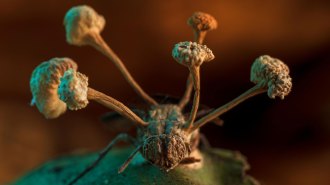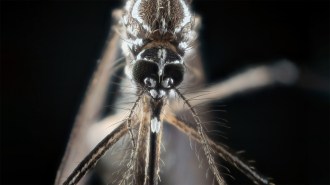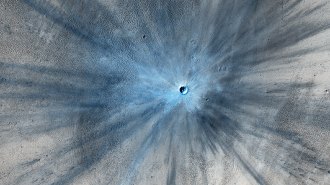Uncategorized
-
 Health & Medicine
Health & MedicineThe new CDC guidelines may make back-to-school harder
The public health agency’s coronavirus advice could change how schools operate and may spur COVID-19 outbreaks in classrooms.
By Meghan Rosen -
 Anthropology
Anthropology‘The Five-Million-Year Odyssey’ reveals how migration shaped humankind
A globe-trotting trek through history shows how past population migrations changed the course of human biology and culture.
By Bruce Bower -
 Life
LifeAn award-winning photo captures a ‘zombie’ fungus erupting from a fly
The winner of the 2022 BMC Ecology and Evolution photo competition captures a macabre cycle of life and death in the Peruvian Amazon.
-
 Environment
EnvironmentCommon, cheap ingredients can break down some ‘forever chemicals’
Forever chemicals, or PFAS, are harmful compounds that are very difficult to degrade. But some are no match for lye and dimethyl sulfoxide.
By Jude Coleman -
 Animals
AnimalsWhy mosquitoes are especially good at smelling you
How Aedes aegypti mosquitoes smell things is different from how most animals do, making hiding human odors from the insects more complicated.
-
 Planetary Science
Planetary ScienceOort cloud comets may spin themselves to death
How icy objects from the solar system’s fringe break up as they near the sun is a long-standing mystery. One astronomer now thinks he has an answer.
-
 Health & Medicine
Health & MedicineThe first known monkeypox infection in a pet dog hints at spillover risk
A person passed monkeypox to a dog. Other animals might be next, allowing the virus to set up shop outside of Africa for the first time.
-
 Particle Physics
Particle PhysicsProtons contain intrinsic charm quarks, a new study suggests
The massive quarks — counterintuitively heavier than the proton itself — might carry about 0.6 percent of a proton’s momentum.
-

Two new books show how sexism still pervades astronomy
In A Portrait of the Scientist as a Young Woman and The Sky Is for Everyone, female astronomers recount how sexism has affected their careers.
-
 Physics
PhysicsSpiraling footballs wobble at one of two specific frequencies
Researchers simulated the path of a flying football to study how pigskins wobble and why they drift sideways.
By Nikk Ogasa -
 Planetary Science
Planetary ScienceAsteroid impacts might have created some of Mars’ sand
Roughly a quarter of the Red Planet’s sand is spherical bits of glass forged in violent impacts, new observations reveal.
-
 Space
SpaceOver time, Betelgeuse changed color. Now it’s also lost its rhythm
A recent upset to the star’s variability and ancient records that describe the red star as yellow tell a tale of a star that is no stranger to change.